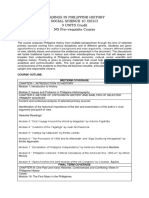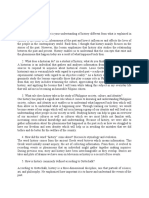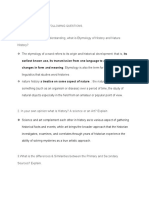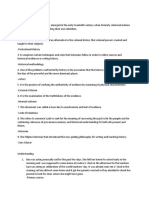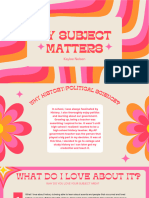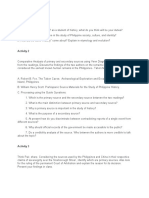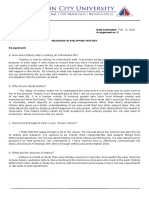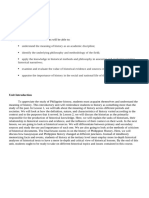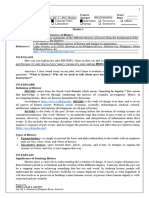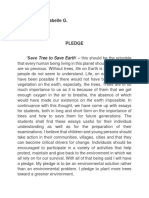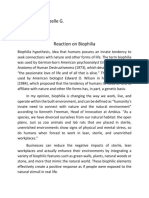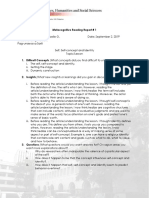0 ratings0% found this document useful (0 votes)
337 viewsThree (3) Things That I Significantly Learned From The Readings
Three (3) Things That I Significantly Learned From The Readings
Uploaded by
Sofia GarciaThe document summarizes Sofia Garcia's reading on the meaning and relevance of history. Sofia learned that the Philippines has a rich history, how to think more deeply about history's relevance to everyday life, and the difference between primary and secondary sources. However, she remains unclear on the exact meaning and relevance of history, how to conduct historical research, and historical methods. Sofia used to think history was boring but now sees its importance after learning more about it. She has questions about changing the past, the most relevant historical event, and consequences of failing to follow historical methods.
Copyright:
© All Rights Reserved
Available Formats
Download as DOCX, PDF, TXT or read online from Scribd
Three (3) Things That I Significantly Learned From The Readings
Three (3) Things That I Significantly Learned From The Readings
Uploaded by
Sofia Garcia0 ratings0% found this document useful (0 votes)
337 views1 pageThe document summarizes Sofia Garcia's reading on the meaning and relevance of history. Sofia learned that the Philippines has a rich history, how to think more deeply about history's relevance to everyday life, and the difference between primary and secondary sources. However, she remains unclear on the exact meaning and relevance of history, how to conduct historical research, and historical methods. Sofia used to think history was boring but now sees its importance after learning more about it. She has questions about changing the past, the most relevant historical event, and consequences of failing to follow historical methods.
Original Description:
metacognitive reading report
Original Title
mrr 1 rph
Copyright
© © All Rights Reserved
Available Formats
DOCX, PDF, TXT or read online from Scribd
Share this document
Did you find this document useful?
Is this content inappropriate?
The document summarizes Sofia Garcia's reading on the meaning and relevance of history. Sofia learned that the Philippines has a rich history, how to think more deeply about history's relevance to everyday life, and the difference between primary and secondary sources. However, she remains unclear on the exact meaning and relevance of history, how to conduct historical research, and historical methods. Sofia used to think history was boring but now sees its importance after learning more about it. She has questions about changing the past, the most relevant historical event, and consequences of failing to follow historical methods.
Copyright:
© All Rights Reserved
Available Formats
Download as DOCX, PDF, TXT or read online from Scribd
Download as docx, pdf, or txt
0 ratings0% found this document useful (0 votes)
337 views1 pageThree (3) Things That I Significantly Learned From The Readings
Three (3) Things That I Significantly Learned From The Readings
Uploaded by
Sofia GarciaThe document summarizes Sofia Garcia's reading on the meaning and relevance of history. Sofia learned that the Philippines has a rich history, how to think more deeply about history's relevance to everyday life, and the difference between primary and secondary sources. However, she remains unclear on the exact meaning and relevance of history, how to conduct historical research, and historical methods. Sofia used to think history was boring but now sees its importance after learning more about it. She has questions about changing the past, the most relevant historical event, and consequences of failing to follow historical methods.
Copyright:
© All Rights Reserved
Available Formats
Download as DOCX, PDF, TXT or read online from Scribd
Download as docx, pdf, or txt
You are on page 1of 1
The Meaning and Relevance of HIstory
Metacognitive Reading Report No. 1
Name: Sofia Isabelle G. Garcia
1. Three (3) Things that I significantly learned from the
readings
First I learned that the Philippines have a rich history.
Second, I learned how to think more deeply and analyze the
relevance of history especially in our everyday lives. Last, I
learned what is the meaning of primary and secondary
sources
2. Three (3) Things that are still unclear to me
First, it is unclear to me what really is the meaning and
relevance of history. Second, it is unclear to me how to
conduct a historical research. Last, the historical methods
are somewhat unclear to me.
3. I used to think that….
I used to think that history was such a boring subject
but when we tackled about it, I saw its importance
4. Three (3) questions that I want to ask about the
readings
If they could change the past would they have done it
differently?
What’s the most relevant evet in the history?
What will happen if you fail to follow the historical
methods?
You might also like
- Lab 6Document6 pagesLab 6Sofia GarciaNo ratings yet
- Evarle MRR1 A59Document2 pagesEvarle MRR1 A59Jeaness EvarleNo ratings yet
- Evarle MRR1Document2 pagesEvarle MRR1Jeaness EvarleNo ratings yet
- Lesson 1.1: Nature, Types, and Relevance of HistoryDocument7 pagesLesson 1.1: Nature, Types, and Relevance of HistoryPaolo RenomeronNo ratings yet
- Assignment 1Document1 pageAssignment 1Danette Chrisha So63% (8)
- Homework 1Document1 pageHomework 1emanNo ratings yet
- Assignment 1Document1 pageAssignment 1Danette Chrisha So100% (1)
- Lesson 1.1 ScSc12nDocument6 pagesLesson 1.1 ScSc12nLyrie CutaraNo ratings yet
- Review of Gottschalk - Understanding History & Howell - From Reliable SourcesDocument3 pagesReview of Gottschalk - Understanding History & Howell - From Reliable SourcesBarinder KaurNo ratings yet
- Module 1 Week 1 Meaning and Relevance of HistoryDocument3 pagesModule 1 Week 1 Meaning and Relevance of HistoryDarwin Sicuan Cama100% (6)
- Now That I Have Stated My Expectations For This Subject, I Hope That I Learn More About This SubjectDocument2 pagesNow That I Have Stated My Expectations For This Subject, I Hope That I Learn More About This SubjectBrendan Rezz R CilotNo ratings yet
- Lesson 1 Meaning and Relevance of HistoryDocument4 pagesLesson 1 Meaning and Relevance of HistoryJanderick DeveraNo ratings yet
- W1-Module1 Meaning and Relevance of HistoryDocument3 pagesW1-Module1 Meaning and Relevance of HistoryDanica VetuzNo ratings yet
- Metacognition Reading ReportDocument2 pagesMetacognition Reading ReportELCBOLECHE HERO M.No ratings yet
- Assessment Activity 1 RPHDocument3 pagesAssessment Activity 1 RPHjohn gabriel bondoyNo ratings yet
- MRR in Readings in Philippine History: NAME: Banzuela, Lalaine Elyse V. Section: A23Document2 pagesMRR in Readings in Philippine History: NAME: Banzuela, Lalaine Elyse V. Section: A23John Reige Malto Bendijo0% (1)
- E. R IN Phil History Mod 1 Week 1 and 2 2020 2021Document9 pagesE. R IN Phil History Mod 1 Week 1 and 2 2020 2021ShinTaxErrorNo ratings yet
- Web Module in ReadingsDocument62 pagesWeb Module in ReadingsJemai J. OliNo ratings yet
- 1 Post TestDocument2 pages1 Post TestALLAINE MALOU ROGADORNo ratings yet
- 1 Post TestDocument2 pages1 Post TestALLAINE MALOU ROGADORNo ratings yet
- History-Social Science ReflectionDocument2 pagesHistory-Social Science Reflectionapi-272567564100% (2)
- History - Chapter 5Document2 pagesHistory - Chapter 5jhon carlo SalvadorNo ratings yet
- MRR in Readings in Philippine History: Answer The Following QuestionsDocument2 pagesMRR in Readings in Philippine History: Answer The Following QuestionsJohn Reige Malto BendijoNo ratings yet
- Lesson 1 Meaning and Relevance of HistoryDocument4 pagesLesson 1 Meaning and Relevance of HistoryHyzel CombeNo ratings yet
- Module 1 Forum 2 What Is HistoryDocument2 pagesModule 1 Forum 2 What Is HistoryNoemiAlodiaMoralesNo ratings yet
- Reading in Phil History 2022Document5 pagesReading in Phil History 2022Elijah Dela TorreNo ratings yet
- Readings in PH History Reviewer For The 1st ChapterDocument4 pagesReadings in PH History Reviewer For The 1st ChapterKay Santos FernandezNo ratings yet
- History 11 - Exercise 1.1Document2 pagesHistory 11 - Exercise 1.1John Michael Luzaran ManilaNo ratings yet
- CHAPTER 1 Module 1Document2 pagesCHAPTER 1 Module 1Hunky DunkyNo ratings yet
- 1 PhilhistoryDocument6 pages1 PhilhistoryBoSs GamingNo ratings yet
- The Lost of San AntonioDocument3 pagesThe Lost of San AntonioJustin Joe GuillermoNo ratings yet
- My Subject MattersDocument8 pagesMy Subject Mattersapi-720402603No ratings yet
- Gerph ActivityDocument1 pageGerph ActivityApril AguigamNo ratings yet
- 1historiography and Its ImportanceDocument59 pages1historiography and Its Importanceclarisse.madayagNo ratings yet
- Hand Outs Chapter 1Document6 pagesHand Outs Chapter 1camille guiaoNo ratings yet
- Section7 RPH FloresDocument2 pagesSection7 RPH FloresTisha FloresNo ratings yet
- 1historiography and Its ImportanceDocument59 pages1historiography and Its Importanceclarisse.madayagNo ratings yet
- GEHI22 Magdadaro Module1 2BSABECDocument14 pagesGEHI22 Magdadaro Module1 2BSABECRuthie Ann Namoc MagdadaroNo ratings yet
- Lesson 2. Historical Criticism Activity 1. Using The Excerpt of Gottchalk's, "Understanding History" and Howell andDocument3 pagesLesson 2. Historical Criticism Activity 1. Using The Excerpt of Gottchalk's, "Understanding History" and Howell andgabcr7montillaNo ratings yet
- Topic 1 Week2 Readings in Philippine HistoryDocument27 pagesTopic 1 Week2 Readings in Philippine HistoryNorielyn DamasoNo ratings yet
- Module 1Document4 pagesModule 1joseph5689No ratings yet
- Sumayang Angelbert A. RIPH Activity 2Document2 pagesSumayang Angelbert A. RIPH Activity 2Sumayang, Angelbert A.No ratings yet
- Guide Questions Page 4&9Document2 pagesGuide Questions Page 4&9Shelley CasaoNo ratings yet
- Module 1 Meaning and Relevance of HistoryDocument9 pagesModule 1 Meaning and Relevance of HistorymerryNo ratings yet
- Exercise 1Document5 pagesExercise 1Bryce ApitNo ratings yet
- Detailed Lesson Plan in Reading in PH HistoryDocument6 pagesDetailed Lesson Plan in Reading in PH HistoryMcLewis dela CruzNo ratings yet
- Riph Module 1 Introduction To HistoryDocument42 pagesRiph Module 1 Introduction To HistoryJohnNo ratings yet
- GE2 Readings in Philippine History Unit 1 Lesson 1Document7 pagesGE2 Readings in Philippine History Unit 1 Lesson 1sjerremarNo ratings yet
- Assignment in RPH - I.EscamisDocument4 pagesAssignment in RPH - I.EscamisIsa BellaNo ratings yet
- History Lesson 1 and 2Document12 pagesHistory Lesson 1 and 2Nicole Joy LuspoNo ratings yet
- Understanding HistoryDocument2 pagesUnderstanding HistoryMAIKEE YDELL RAGANDANG REYESNo ratings yet
- RPH Study GuideDocument58 pagesRPH Study GuideMary Lindsay ComediaNo ratings yet
- History Module 1Document4 pagesHistory Module 1XhyreneNo ratings yet
- Gerph Assignment # 1: NAME: Joniel Martin Bebedor Year / Course: Fisrt Year, BsitDocument2 pagesGerph Assignment # 1: NAME: Joniel Martin Bebedor Year / Course: Fisrt Year, BsitJoniel MartinNo ratings yet
- Gerph Assignment 1Document2 pagesGerph Assignment 1Joniel MartinNo ratings yet
- Lesson 1 Introduction To HistoryDocument40 pagesLesson 1 Introduction To Historybobadillamarie156No ratings yet
- Readings in Philippine History WEEK 1-2 LORCENA, DARWINDocument4 pagesReadings in Philippine History WEEK 1-2 LORCENA, DARWINCedric OrdoñezNo ratings yet
- Week 1 Gen Ed 2Document5 pagesWeek 1 Gen Ed 2Bill Russell CecogoNo ratings yet
- Nigerian Peoples and Culture (Ges)Document27 pagesNigerian Peoples and Culture (Ges)Signapore SignaporeNo ratings yet
- Transitional Life of Viola: “Oral History”—An “Oral Testimony”From EverandTransitional Life of Viola: “Oral History”—An “Oral Testimony”No ratings yet
- Machine Problem 3Document5 pagesMachine Problem 3Sofia GarciaNo ratings yet
- Blackboard Activity 2 GARCIA E06Document8 pagesBlackboard Activity 2 GARCIA E06Sofia GarciaNo ratings yet
- Name: Sofia Isabelle G. Garcia Program & Year: CE - 2 Section: E06 Seat No.: - Date: 06/22/2020 Blackboard Activity Matrices 4 Quarter 2019 - 2020Document8 pagesName: Sofia Isabelle G. Garcia Program & Year: CE - 2 Section: E06 Seat No.: - Date: 06/22/2020 Blackboard Activity Matrices 4 Quarter 2019 - 2020Sofia GarciaNo ratings yet
- Garcia, Sofia Isabelle G. GED101-A83: Save Tree To Save Earth' - This Should Be The PrincipleDocument1 pageGarcia, Sofia Isabelle G. GED101-A83: Save Tree To Save Earth' - This Should Be The PrincipleSofia GarciaNo ratings yet
- Garcia, Sofia Isabelle G. GED101-A83 Reaction On BiophiliaDocument2 pagesGarcia, Sofia Isabelle G. GED101-A83 Reaction On BiophiliaSofia GarciaNo ratings yet
- Want More Explanations About?Document1 pageWant More Explanations About?Sofia GarciaNo ratings yet
- RWSLESSON1 2Document9 pagesRWSLESSON1 2Sofia Garcia100% (2)
- MRR Uts 4Document2 pagesMRR Uts 4Sofia GarciaNo ratings yet
- Survey QuestionnaireDocument3 pagesSurvey QuestionnaireSofia Garcia100% (1)
- University of Perpetual Help System Laguna - JONELTA: Basic Education Department - Senior High SchoolDocument1 pageUniversity of Perpetual Help System Laguna - JONELTA: Basic Education Department - Senior High SchoolSofia GarciaNo ratings yet


















